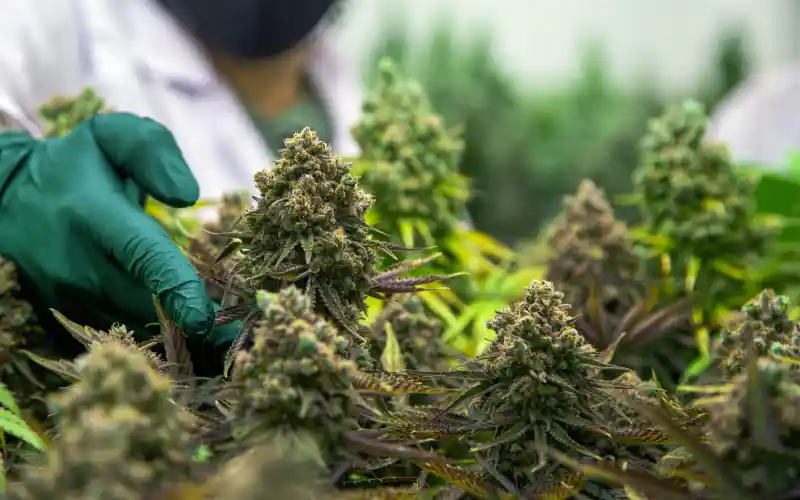Business
Senate Panel Approves Cannabis Research Bill

The Senate Veterans Affairs Committee has advanced legislation directing the VA to conduct research into cannabis as a treatment for chronic pain and PTSD.
A U.S. Senate panel last week approved a bill that directs the Department of Veterans Affairs (VA) to conduct research into cannabis as a treatment for chronic pain and post-traumatic stress disorder (PTSD). The bipartisan legislation, which was introduced by Montana Democrat Senator Jon Tester on February 9 and co-sponsored by Senator Dan Sullivan, a Republican from Alaska, was approved by the Senate Veterans Affairs Committee with a vote during a closed-door session on Thursday.
Under the bill (S. 326), the VA would be tasked with conducting a large-scale observational study that evaluates the safety and efficacy of cannabis as a treatment for PTSD and chronic pain. An identical bill (H.R. 1003) sponsored by California Democratic Representative Lou Correa is also pending in the House of Representatives, with Republican Representative Jack Bergman signed on as a co-sponsor.
The observational study would explore the positive and negative health outcomes of cannabis use by veterans, including whether using marijuana reduces the use of alcohol or opiates. The study would also investigate other aspects of medicinal cannabis use, including sleep quality, pain intensity, agitation, and overall quality of life. Once the study is complete, the legislation requires the VA to report back to Congress on the results and the feasibility of conducting clinical trials.
Senate Veterans Affairs committee chair Jon Tester, a Democrat from Montana, said in a statement when he introduced the bill earlier this month that the legislation will give military veterans new choices to manage their health care.
“Our nation’s veterans deserve options when it comes to treating the wounds of war, which is why VA needs to have a better understanding of how medicinal cannabis plays a role in their healing,” Tester said. “Our bipartisan bill ensures VA is listening to the growing number of veterans who find critical relief from alternative treatments like medicinal cannabis, while working to empower veterans in making safe and informed decisions about their health.”
A New Milestone In Cannabis Policy Reform
Lawmakers in both chambers of Congress have introduced similar legislation in previous years, including a bill that was approved by the House Veterans Affairs Committee two years ago. Thursday’s approval by the Senate panel, however, is the first advancement of a veterans cannabis research bill in the upper chamber of Congress.
“Many of our brave men and women in uniform suffer from unseen wounds of war as a result of their sacrifices on behalf of our country, wounds that often manifest in post-traumatic stress,” Sullivan said in a statement when the bill was introduced. “We owe it to these courageous service members, past and present, to explore and better understand new remedies for these mental health challenges that are safe and effective, treatments that could give our suffering veterans hope.”
Tester’s bill also directs the VA to assess the ability of the agency to coordinate FDA-approved clinical trials into the safety and effectiveness of cannabis and cannabis extracts for health care among veterans. If approved by the VA, the clinical trials would provide study participants with cannabis products from federally licensed producers and compare the results with a control group.
Thursday’s approval of S. 326 by the Senate Veterans Affairs Committee is being hailed by medical marijuana and cannabis policy reform advocates as a significant step forward in the movement to end the prohibition of weed in the United States.
“I’m heartened to see the U.S. Senate take an essential step forward on what should be a priority we all agree on — taking care of our country’s veterans and providing them with alternative treatments for things like PTSD and chronic pain management,” Steven Jung, a U.S. Army veteran and the chief operations officer of vaporizer manufacturer PAX, said in an email to High Times. “Veterans are in crisis and at much greater risk of suicide than the national average, and it’s time we take action now.”
Source: https://hightimes.com/news/senate-panel-approves-cannabis-research-bill/
Business
New Mexico cannabis operator fined, loses license for alleged BioTrack fraud

New Mexico regulators fined a cannabis operator nearly $300,000 and revoked its license after the company allegedly created fake reports in the state’s traceability software.
The New Mexico Cannabis Control Division (CCD) accused marijuana manufacturer and retailer Golden Roots of 11 violations, according to Albuquerque Business First.
Golden Roots operates the The Cannabis Revolution Dispensary.
The majority of the violations are related to the Albuquerque company’s improper use of BioTrack, which has been New Mexico’s track-and-trace vendor since 2015.
The CCD alleges Golden Roots reported marijuana production only two months after it had received its vertically integrated license, according to Albuquerque Business First.
Because cannabis takes longer than two months to be cultivated, the CCD was suspicious of the report.
After inspecting the company’s premises, the CCD alleged Golden Roots reported cultivation, transportation and sales in BioTrack but wasn’t able to provide officers who inspected the site evidence that the operator was cultivating cannabis.
In April, the CCD revoked Golden Roots’ license and issued a $10,000 fine, according to the news outlet.
The company requested a hearing, which the regulator scheduled for Sept. 1.
At the hearing, the CCD testified that the company’s dried-cannabis weights in BioTrack were suspicious because they didn’t seem to accurately reflect how much weight marijuana loses as it dries.
Company employees also poorly accounted for why they were making adjustments in the system of up to 24 pounds of cannabis, making comments such as “bad” or “mistake” in the software, Albuquerque Business First reported.
Golden Roots was fined $298,972.05 – the amount regulators allege the company made selling products that weren’t properly accounted for in BioTrack.
The CCD has been cracking down on cannabis operators accused of selling products procured from out-of-state or not grown legally:
- Regulators alleged in August that Albuquerque dispensary Sawmill Sweet Leaf sold out-of-state products and didn’t have a license for extraction.
- Paradise Exotics Distro lost its license in July after regulators alleged the company sold products made in California.
Golden Roots was the first alleged rulebreaker in New Mexico to be asked to pay a large fine.
Source: https://mjbizdaily.com/new-mexico-cannabis-operator-fined-loses-license-for-alleged-biotrack-fraud/
Business
Marijuana companies suing US attorney general in federal prohibition challenge

Four marijuana companies, including a multistate operator, have filed a lawsuit against U.S. Attorney General Merrick Garland in which they allege the federal MJ prohibition under the Controlled Substances Act is no longer constitutional.
According to the complaint, filed Thursday in U.S. District Court in Massachusetts, retailer Canna Provisions, Treevit delivery service CEO Gyasi Sellers, cultivator Wiseacre Farm and MSO Verano Holdings Corp. are all harmed by “the federal government’s unconstitutional ban on cultivating, manufacturing, distributing, or possessing intrastate marijuana.”
Verano is headquartered in Chicago but has operations in Massachusetts; the other three operators are based in Massachusetts.
The lawsuit seeks a ruling that the “Controlled Substances Act is unconstitutional as applied to the intrastate cultivation, manufacture, possession, and distribution of marijuana pursuant to state law.”
The companies want the case to go before the U.S. Supreme Court.
They hired prominent law firm Boies Schiller Flexner to represent them.
The New York-based firm’s principal is David Boies, whose former clients include Microsoft, former presidential candidate Al Gore and Elizabeth Holmes’ disgraced startup Theranos.
Similar challenges to the federal Controlled Substances Act (CSA) have failed.
One such challenge led to a landmark Supreme Court decision in 2005.
In Gonzalez vs. Raich, the highest court in the United States ruled in a 6-3 decision that the commerce clause of the U.S. Constitution gave Congress the power to outlaw marijuana federally, even though state laws allow the cultivation and sale of cannabis.
In the 18 years since that ruling, 23 states and the District of Columbia have legalized adult-use marijuana and the federal government has allowed a multibillion-dollar cannabis industry to thrive.
Since both Congress and the U.S. Department of Justice, currently headed by Garland, have declined to intervene in state-licensed marijuana markets, the key facts that led to the Supreme Court’s 2005 ruling “no longer apply,” Boies said in a statement Thursday.
“The Supreme Court has since made clear that the federal government lacks the authority to regulate purely intrastate commerce,” Boies said.
“Moreover, the facts on which those precedents are based are no longer true.”
Verano President Darren Weiss said in a statement the company is “prepared to bring this case all the way to the Supreme Court in order to align federal law with how Congress has acted for years.”
While the Biden administration’s push to reschedule marijuana would help solve marijuana operators’ federal tax woes, neither rescheduling nor modest Congressional reforms such as the SAFER Banking Act “solve the fundamental issue,” Weiss added.
“The application of the CSA to lawful state-run cannabis business is an unconstitutional overreach on state sovereignty that has led to decades of harm, failed businesses, lost jobs, and unsafe working conditions.”
Business
Alabama to make another attempt Dec. 1 to award medical cannabis licenses

Alabama regulators are targeting Dec. 1 to award the first batch of medical cannabis business licenses after the agency’s first two attempts were scrapped because of scoring errors and litigation.
The first licenses will be awarded to individual cultivators, delivery providers, processors, dispensaries and state testing labs, according to the Alabama Medical Cannabis Commission (AMCC).
Then, on Dec. 12, the AMCC will award licenses for vertically integrated operations, a designation set primarily for multistate operators.
Licenses are expected to be handed out 28 days after they have been awarded, so MMJ production could begin in early January, according to the Alabama Daily News.
That means MMJ products could be available for patients around early March, an AMCC spokesperson told the media outlet.
Regulators initially awarded 21 business licenses in June, only to void them after applicants alleged inconsistencies with how the applications were scored.
Then, in August, the state awarded 24 different licenses – 19 went to June recipients – only to reverse themselves again and scratch those licenses after spurned applicants filed lawsuits.
A state judge dismissed a lawsuit filed by Chicago-based MSO Verano Holdings Corp., but another lawsuit is pending.
Source: https://mjbizdaily.com/alabama-plans-to-award-medical-cannabis-licenses-dec-1/
-

 Business2 years ago
Business2 years agoPot Odor Does Not Justify Probable Cause for Vehicle Searches, Minnesota Court Affirms
-

 Business2 years ago
Business2 years agoNew Mexico cannabis operator fined, loses license for alleged BioTrack fraud
-

 Business2 years ago
Business2 years agoAlabama to make another attempt Dec. 1 to award medical cannabis licenses
-

 Business2 years ago
Business2 years agoWashington State Pays Out $9.4 Million in Refunds Relating to Drug Convictions
-

 Business2 years ago
Business2 years agoMarijuana companies suing US attorney general in federal prohibition challenge
-

 Business2 years ago
Business2 years agoLegal Marijuana Handed A Nothing Burger From NY State
-

 Business2 years ago
Business2 years agoCan Cannabis Help Seasonal Depression
-

 Blogs2 years ago
Blogs2 years agoCannabis Art Is Flourishing On Etsy











